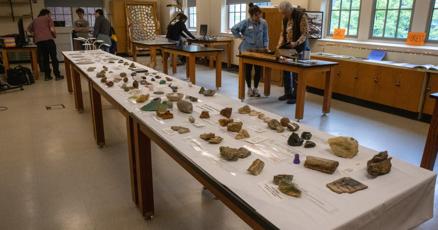Sweet Science: How Honey Has Been Healing Humans for Millennia
Science
2025-04-17 11:48:40Content

A Sweet Remedy: Understanding Honey's Healing Powers and Nutritional Balance
For millennia, honey has been revered as a natural healing elixir, cherished by cultures worldwide for its remarkable medicinal properties. While its golden sweetness offers impressive health benefits, nutritional experts caution consumers to approach this liquid treasure with mindful moderation.
Beyond its delectable flavor, honey is more than just a simple sugar—it's a complex natural substance packed with antioxidants, enzymes, and trace minerals. However, it's crucial to remember that at its core, honey is still a form of sugar. Consuming it judiciously is key to harnessing its potential without overwhelming your body with unnecessary calories.
Discerning honey enthusiasts understand that not all honey is created equal. Exploring different varieties—from raw, unprocessed local honey to specialized monofloral types like manuka or lavender—can enhance both culinary experiences and potential health advantages. By selecting high-quality, minimally processed honey, consumers can maximize nutritional benefits while enjoying a natural sweetener.
The message is clear: embrace honey's healing potential, but do so with knowledge, balance, and a thoughtful approach to consumption.
Sweet Science: Unveiling the Medicinal Mysteries of Nature's Golden Elixir
In the realm of natural remedies, few substances have captured human imagination and healing potential quite like honey. This extraordinary substance, produced by industrious bees through an intricate process of nectar transformation, represents more than just a sweet condiment—it embodies centuries of traditional medicine, scientific intrigue, and holistic wellness.Unlock the Healing Power of Liquid Gold: Your Ultimate Guide to Honey's Transformative Potential
The Ancient Origins of Honey's Medicinal Legacy
Honey's therapeutic journey stretches back millennia, transcending cultural boundaries and medical paradigms. Archaeological evidence reveals that ancient civilizations like the Egyptians, Greeks, and Chinese recognized honey's remarkable healing properties. Physicians and healers documented its extraordinary capabilities in treating wounds, combating infections, and supporting overall health. The complex biochemical composition of honey—comprising enzymes, antioxidants, minerals, and unique phytochemicals—makes it a sophisticated natural medicine far beyond a simple sweetener. Researchers have extensively studied honey's antimicrobial properties, discovering its ability to inhibit bacterial growth through multiple mechanisms. Unlike synthetic antibiotics, honey's resistance-fighting potential stems from its unique molecular structure, which creates an inhospitable environment for pathogenic microorganisms.Nutritional Complexity: Beyond Simple Sugar
While honey contains natural sugars, its nutritional profile is remarkably intricate. Different honey varieties—derived from specific floral sources—offer distinct therapeutic characteristics. Manuka honey from New Zealand, for instance, demonstrates exceptional wound-healing capabilities due to its elevated methylglyoxal content. Buckwheat honey presents higher antioxidant concentrations compared to lighter varieties, suggesting potential cardiovascular and immune-supporting benefits. Nutritionists emphasize that honey's glycemic impact varies significantly based on its botanical origin and processing methods. Raw, unfiltered honey retains more nutritional complexity compared to heavily processed commercial variants, preserving essential enzymes and micronutrients that contribute to its therapeutic potential.Modern Scientific Perspectives on Honey's Healing Potential
Contemporary medical research continues to validate traditional knowledge surrounding honey's medicinal applications. Clinical studies have demonstrated its effectiveness in wound management, particularly for treating burns, reducing inflammation, and preventing infection. The substance's natural humectant properties create an optimal healing environment, promoting tissue regeneration and minimizing scarring. Beyond wound care, emerging research explores honey's potential in managing chronic conditions. Preliminary studies suggest potential benefits for gastrointestinal health, respiratory function, and metabolic regulation. However, researchers consistently emphasize the importance of understanding honey as a complementary intervention rather than a standalone treatment.Sustainable Consumption and Ethical Considerations
Responsible honey consumption extends beyond personal health considerations. Sustainable beekeeping practices play a crucial role in maintaining ecological balance and supporting global biodiversity. Consumers are increasingly encouraged to source honey from local, environmentally conscious producers who prioritize bee welfare and habitat preservation. Understanding honey's complexity requires acknowledging its production's intricate ecological dynamics. Each teaspoon represents an extraordinary collaborative effort between bees, flowering plants, and environmental conditions—a delicate symbiosis that demands respect and mindful consumption.Navigating Honey Selection: Quality and Authenticity
Discerning high-quality honey requires careful consideration of multiple factors. Consumers should prioritize raw, unprocessed varieties that retain maximum nutritional integrity. Indicators of superior honey include cloudiness, crystallization, and evidence of minimal heat treatment. Organic certifications and transparent sourcing information provide additional quality assurances. Experts recommend diversifying honey consumption across different botanical varieties to maximize potential health benefits. By exploring regional and varietal differences, individuals can develop a nuanced understanding of this remarkable substance's therapeutic potential.RELATED NEWS
Science

Transforming Science Education: VTS Secures Groundbreaking Grant for Innovative Learning Program
2025-04-11 01:01:27
Science

Laugh Your Way to Science Credibility: How Humor Builds Trust in Research
2025-03-10 17:21:00
Science

Science vs. Skepticism: Why Conservative Voters Are Turning Away from Research
2025-04-14 13:33:03





